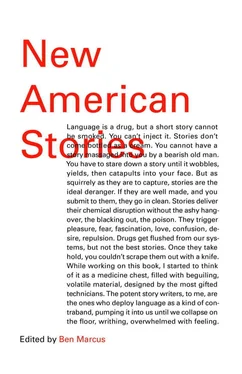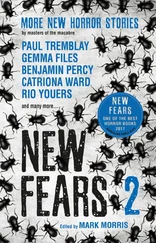I was nervous, and I was going to remember this for the rest of my life.
There was a nurses’ station, but when I went over no one was at it. I slid the window open and put my head through. All I saw was extra pamphlets and forms piled around a computer, but I still felt sneaky so I stopped looking. Soon enough the red-haired cat-eyed nurse returned and the boy went through the double doors into the back with his mom, dad, and cowlick. My mom took another call and the room echoed with her voice. My dad walked around inspecting things — looking into the nurses’ station to see what I’d been looking at, squinting at a poster, pressing a thumb into the cushion on the chair like meat to test it for doneness, picking a stray bit of paint from the glass of the window that looked onto the parking lot. He was trying to find something to comment on. He picked up a pamphlet from a rack and started to say something but swallowed it and pretended to be chuckling to himself. There’s no such thing as chuckling to yourself. You do it so someone will notice, even if you’re by yourself and the person is imaginary. My parents are such a classic couple. They’ll either get divorced or he’ll get smaller and smaller and she’ll get bigger and bigger until they die. Then the red-haired cat-eyed nurse came through the double doors with a smile like homemade pie and said, “Ready, sweetheart?”
“Remember,” my mother said, “you, too, could grow up to be a madman.”
Shut up, Mom. No one cares about this more than I do.
—
The gallery was white and clean, and everything — the bars on the cells, the bars on the beds in the cells, even the chamber pots — seemed thicker because of layers of white paint, the sheets fragile by comparison. How could Carrie have looked each one in the eyes? The hall was narrow and endless, like a mirror facing a mirror. You could never look into all those eyes. The space swam with light and occasional arms of madmen waved through the bars. The ceiling was so white it disappeared. Cells lined one side, and the other side was a vast blank wall to walk along. This meant that you could only look into one cell at a time, but if you stayed near the wall you could keep out of reach. I could hear, dimly, that there was an army, like millions of them, beyond the walls. It was the sound of madmen who were not ready. My mother gripped my elbow and adjusted the strap of her purse.
I know from case studies in our Health and Human Development book that when a madman is reeling with madness it’s like his skin is ripped off, his consciousness is that naked. Just stepping from the entryway into view of the first cell I felt something — a wave — like there was empty space left where all these people had been so naked and now I was standing in it. The madman in there wasn’t even looking at me and I felt it. In fact, he was facing the back wall. He was bare and yellowish, with the knobs of his spine poking out and a cloth tied around his waist. He might have been peeing, my first potential madman. But he might have just been standing there, looking at the wall. I was just standing there, looking at the bars, with my mom latched to my elbow. Hands deep in his pockets, my father approached the laminated information card at the first madman’s cell and read it for our information in a low voice while I took in this prospect with my eyes.
He was a Melancholic madman. He glanced at us absently and then took a seat in a back corner of the cell on a three-legged stool, resting his chin on his fist.
“ ‘Appearance: gloomy brow, shrunken head, lethargic, passive,’ ” my father read. “ ‘Medical history: mad with grief after violating his word to his wife; shunned men and fled to the forest.’ ”
“I don’t know, what do you think?” said my mother.
“I don’t know,” I said. I didn’t know what to do — imagine my life as his, or imagine him in my life, or what. At some point the nurse had left, and I felt very alone.
“Let’s look at another,” my mother said, and I knew that meant he would be fine for another girl, but not for us. I’d settled on picturing him on his stool by the window in our shed with his gloomy brow, in his thinking position. Where was I in this picture? Was I stirring his pot? Was I pulling up a stool of my own to sit beside him? Was he starting to cry? We stepped to the next cell.
This madman paced and a broken chain from one arm dragged on the ground. He had heaping wads of wiry hair.
“ ‘Appearance,’ ” read my father. My mother craned her neck over his shoulder at the card, to keep an eye on if he’d miss something. “ ‘A bold, threatening mien, a hurried step, splayed gait, restless hands, violent breathing.’ ” In the madman’s hair I could see a bird’s nest and part of a blue eggshell. His eyes moved mechanically in his head, like they had little rollers behind them, but I could hear him making low animal noises of being alive. His sandals slapped the floor as he paced, making angrier slaps than I thought sandals could even make. Heat came off him like from a toaster. Then he whirled to face me, looked right at me, and said, “I heard that, pussy,” and before I could even register this, my mother had yanked me to the next cell.
“Perverts are still madmen, but don’t pick a pervert just to pick a pervert,” she said.
The madman with the nest called, “I can fucking hear you!”
But it was interesting — as soon as we were no longer in front of his cell, it was as if we’d changed the channel. I could hear the dull white noise of whatever world tumbled down the hill behind the gallery, but it must have been something with the acoustics because I could no longer hear the madman at all — not his breathing or his sandals or his chain or anything he might have yelled — not once I was looking into the next cell. They’d really made things orderly. Or my brain had done it. But either way. I saw so many madmen that day: the whole world was made of one madman, and then it was made of the next.
The next was a Decadent Hedon, hunched under a burlap robe, but I could tell by the way the folds fell that he was leaning on a crook: “ ‘Appearance’ ” (my mother reading this time), “ ‘slothful, bloated, swarthy, indolent, irresolute, fair hair, eburnated protrusions, overall sour.’ ” His sleeve slipped and showed a hand, but immediately he shifted just enough for the cloth to cover it again. He had long nails. “ ‘Medical history: succumbed to the folly of the idle rich. Discovered inebriated at a marina.’ ” My mother read it like a schoolchild, or a schoolteacher, that voice. Even though the Decadent Hedon ignored us, I felt embarrassed with my parents reading as if he wasn’t there. I kept trying to look at him in a way that would let him know. Then I thought, What, should we not read the information? That’s when I said, “Hello, I’m Alice.” I didn’t expect any one thing or another. On impulse I guess I thought he might appreciate it.
“Fantastico,” said the madman, rolling his eyes either at me or because that’s what madmen do. The tone, though, was pretty obviously “You know what I mean, you pawn/idiot/cracker/et cetera.”
I thought of our shed and the curtains from my bedroom. I knew a madman like that wouldn’t like me. He didn’t say anything else, in fact he went right back to not acknowledging that we were there, just gazed, lazy-eyed, as if over a vast tabletop, through the wall behind me, through the waiting area beyond it, and out over the hills and valleys of whatever the hell he thought of the world.
I felt ashamed that I wanted so badly for my madman to like me. Like this was all about me. Which it was. I was the one coming of age.
I don’t know how I got us to the next one. Oh, yes I do: my mother said, “Honey, have a look at this.”
Читать дальше










![Женя Джентбаев - neo futura [stories]](/books/692472/zhenya-dzhentbaev-neo-futura-stories-thumb.webp)

